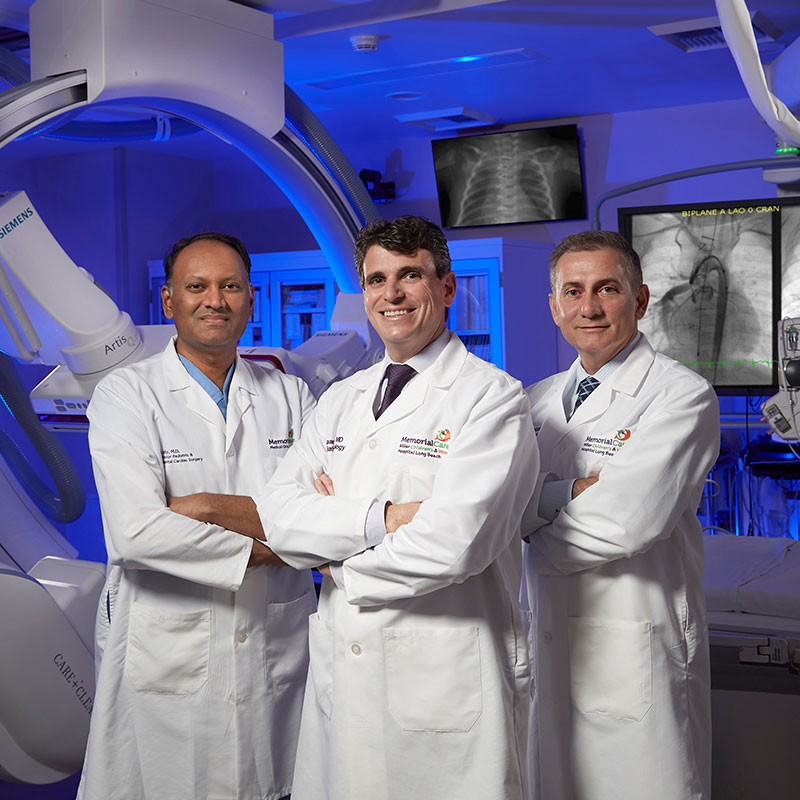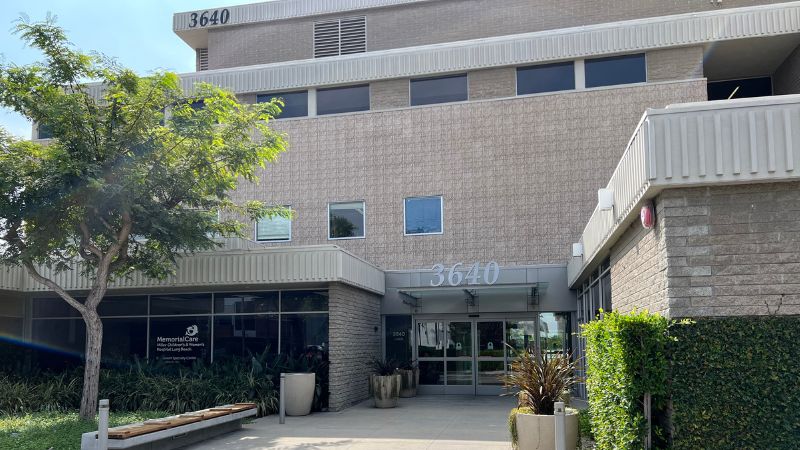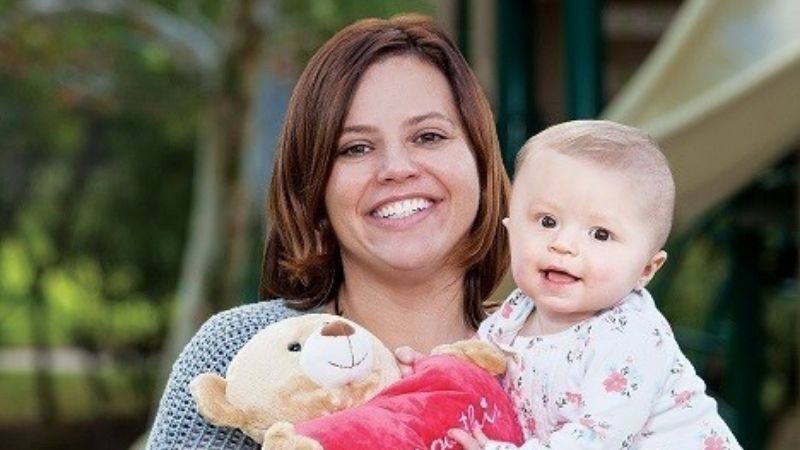The Children’s Heart Institute at MemorialCare Miller Children's & Women's Hospital Long Beach provides total prenatal, infant, pediatric and young adult heart care for patients with congenital or acquired heart disease, patients who have a family history of heart problems, or kids and teens who are diagnosed with a congenital heart defect later in life.
We diagnose pediatric heart disease using non-invasive or minimally invasive tests and procedures, such as electrocardiograms, echocardiograms, exercise stress tests, 24-hour holter monitors and heart catheterizations.
We have a state-of-the-art cardiac catheterization laboratory, which includes bi-plane imaging, instead of traditional single-plane imaging. Bi-plane imaging uses X-ray technology to take pictures of a patient with two cameras, instead of one. This enhances a doctor’s vision to see the smallest blood vessels – which is especially important for infants and kids with such tiny hearts.
Biplane imaging cameras take detailed x-rays during a minimally invasive procedure, such as an angiography, that are shown in real time on a monitor just a few feet from where doctors can watch and determine what treatment should be provided based on the pictures.
For children with heart disease that require cardiac surgery, our care team works closely with surgeons from the start of the procedure, follows the patient through discharge from the hospital, and into post-operative follow-up care.
Infants or children who need to stay in the hospital are cared for in the Cardiothoracic Intensive Care Unit (CTICU) located in the Cherese Mari Laulhere Pediatric Intensive Care Unit. A team of specialty-trained doctors, nurses, respiratory care practitioners and other team members provide the highly specialized cardiac care that children with heart issues need.

We offer extensive diagnostics in order to accurately diagnose and treat each patient. Comprehensive cardiology diagnostic care includes:
Fetal Echocardiogram
Fetal echocardiography is an ultrasound test that uses sound waves to study the structure of a baby’s heart before birth. Fetal echocardiograms are used if a cardiac malformation is suspected by a prenatal ultrasound or if a woman has an increased risk of having a baby with congenital heart disease.
Echocardiogram
An echocardiogram is an ultrasound test that uses sound waves to create a picture of the child’s heart and its circulation to check for narrowing of the aorta.
Electrocardiogram (EKG)
An Electrocardiogram (EKG) is a test that measures the electrical activity of the heartbeat. An electrical impulse travels through the heart with each beat. The electrical pulse causes the muscle to squeeze and pump blood from the heart.
Treadmill Stress Testing
A treadmill stress tests help doctors find out how well a child’s heart handles exercise. As the child’s body works harder during the test, it requires more oxygen, so the heart must pump more blood. The test can show if the blood supply is reduced in the arteries that supply the heart. It also helps pediatric cardiologists know the level of exercise appropriate for a child.
24-Hour Holter Monitoring
A 24-hour holter monitor is a machine that continuously records the heart's rhythms, within a 24-hour time period, during normal activity. Electrodes are stuck to the chest and attached to a small recording monitor that records the heart's electrical activity to document any irregular heart rhythms. Sometimes the pediatric cardiologist will ask a patient to keep a diary of activities while wearing the monitor.
30-Day Event Monitoring
Event recorders use a circular tape that stores only 30 seconds of a patient's most recent heart rhythm. When the patient experiences a symptom, such as a heart palpitation or an irregular heart beat/pace, the child presses a button that freezes the recording. The recording is then transmitted by telephone to an interpreting center.
Cardiac CT/MRI
Cardiac imaging techniques and technologies, such as Cardiac Magnetic Resonance Imaging (MRI) and Cardiac Computed Tomography (CT), allow pediatric cardiologists to take a closer look at the heart and great vessels at little risk to the patient.
Diagnostic Heart Catheterization
Diagnostic cardiac catheterization is a heart test, where soft, thin plastic catheters (tubes) are placed in the large blood vessels, usually in the leg or groin area, and passed through arteries or veins carefully to the heart. Once the catheters are positioned in the various heart chambers or blood vessels, pressure measurements and blood samples inside the heart can be taken. Also, an angiography can be performed, where contrast or dye (radiographic contrast material) can be injected so pictures of the heart can be taken through an x-ray. Children are usually under local anesthesia during this test.
The team thoroughly manages a child’s heart defect or condition with regular follow-up visits, additional diagnostic testing and preventative care to ensure a healthy lifestyle in the outpatient setting.
If a child has a significant procedure or surgery that required hospitalization, the pediatric cardiology team manages the child’s condition during hospitalization and immediately into the outpatient setting. An appointment is usually set up within a week after a child has been discharged to start the follow-up care as quickly as possible. During this follow-up visit, the patient will:
- Have their procedure/surgical incision area checked
- Have a chest X-ray or echocardiogram completed
- Have blood work drawn
- See additional members of the heart care team, such as the dietician or occupational therapist to get back to daily, living activities.
- Follow-up care could last just a few months or continue indefinitely, because a congenital defect needs constant monitoring and further procedures or surgery may still be needed.
Preventative Care
Promoting preventative heart care and teaching children and their families about healthy lifestyles, is essential to the health of children with both acquired and congenital heart conditions. We identify and medically manage cholesterol and blood pressure problems early in life, to help prevent heart attack or stroke later.
Our care team develops a comprehensive care plan after a health evaluation, based on the causes for a child to have abnormal cholesterol or blood pressure. The care plan typically includes a weight-loss component, heart healthy eating and exercise. Follow-up appointments can include routine monitoring of cholesterol levels, triglycerides and blood pressure.
To make it convenient for patients and their families, we have diagnostic care available at satellite locations, as well as the hospital. Both outpatient locations house advanced cardiovascular equipment, such as onsite EKG and ECHO. This allows the cardiology care team the ability to diagnose a wide range of heart and vascular conditions for babies, infants, children and adolescents. Once treatment plans are made, the patient goes through a comprehensive follow-up program to monitor the condition and reinforce preventative care.
Approved CCS Center
The Cardiology Center in the Cherese Mari Laulhere Children's Village is CCS certified, allowing children who receive CCS coverage to visit the outpatient center on special days, as well as children with Medi-Cal, HMO and private coverage.
Healthy Kids Program
The Healthy Kids Program at the Torrance Outpatient Specialty Center offers a multi-disciplinary approach to healthy weight management and preventative care for children and teens at risk of developing serious health problems, such as high cholesterol and high blood pressure.
We are committed to basic science, translational and clinical research. Whether through a national consortium or enrollment in a clinical trial for one of our care centers, physicians and the health care team, we work to uncover the complex intricacies of pediatric illnesses. This keeps us at the leading edge of technology and gives the pediatric health care community access to the latest research data.
Family Resources
Use the tools below to learn more about your child’s condition or upcoming procedure:
The word “congenital” means the heart defect existed at your child’s birth. Your child’s heart problem is not a “disease” but rather a defect or abnormality. A heart defect occurs when the heart, or blood vessels near the heart, don’t develop properly before birth.
Sometimes there aren’t outward symptoms, because the defect is mild. In other cases, it’s so severe that the newborn becomes ill soon after birth. Signs and symptoms also may develop later in life, as the child gets older.

What is the Cause of a Congenital Heart Defect?
Congenital heart defects do not occur in a majority of children, but when they do occur there often is not a known cause. Sometimes a problem can happen when the baby is still developing in their mother’s uterus, during the formation and growth of the heart. There are some ties to congenital heart defects and genetics. Several genetic syndromes, such as down and noonan syndromes, have cardiac malformations.
Environmental exposures to the mother early in pregnancy also can be associated with congenital heart defects including:
- Some medications for seizures, acne or bipolar psychiatric disorder
- Having viral diseases, such as rubella (German measles), phenylketonuria and diabetes
- Exposure to certain chemicals
- Alcohol abuse and drug use
- Fetal echocardiograms may help detect problems as early as mid-pregnancy.
What Does This Mean For Your Child?
Congenital heart defects were once thought hopeless. However today, if your child is born with a heart defect, the chances are better than ever that the defect can be overcome and that your child can lead a normal adult life.
- More than 1.3 million Americans alive today have some form of congenital heart defect, and about one-half of these individuals are less than 25 years of age.
- At least nine of every 1,000 infants born each year have a heart defect, totaling almost one percent of live-born infants.
- In the U.S., about 36,000 children are born with a heart defect each year.
Recent scientific progress in diagnosis and treatment of heart defects, such as interventional cardiac catheterization and cardiac surgery, have improved success rates to correct most defects. As technology, research and science advance, more progress on treatments will be made. Most children can be helped by surgery even if the defect is severe.

Sometimes heart disease can present itself later in life. If you notice any of these symptoms of heart disease, talk to a pediatric cardiologist.
- Dizziness spells
- Fainting during sports or activity
- Your child complains of their “heart jumping” — this could mean they are experiencing irregular heartbeats or palpitations
- Show signs of high blood pressure
Preventative Measures to Promote a Strong Heart
- Stay active
- Eat fruits and veggies
- Go for a bike ride
- Visit your doctor for a check-up
- Say NO to drugs
- Dance with your friends and family
- Take your dog for a walk
- Jump — see how high you can jump or jump rope
- Instead of playing video games, play outside
- While you’re watching TV — do some jumping jacks
- Play a sport — join a team or make a team with friends
- Help your family clean the house or work in the yard
Heart disease is not a major cause of death among children and teenagers, but it is the largest cause of death among adults in the United States. Promoting a healthy lifestyle at a young age can improve your child’s chances of staying a healthy adult and prevent heart disease in their future.
Researchers have found certain “risk factors” that play an important role in a person's chances of developing heart disease. Most of the risk factors that affect children can be controlled early in life, lowering the risk of heart disease later.
Children and teens can reduce their chance for heart disease by changing or controlling the following “risk factors:”
- High blood pressure
- High cholesterol
- Obesity
- Physical inactivity
- Smoking
- Prevention is the best way to avoid a heart problem later in life
Centers & Programs
Our Pediatric & Adult Congenital Cardiac Surgery Program can treat anyone, who has discovered later in life that they have a congenital heart defect or have complications from previous treatment.
The Mighty Hearts Program provides comprehensive rehabilitation services across the continuum of care to meet the unique needs of children with congenital heart disease and acquired heart conditions.
Your Care Team
We have board-certified pediatric cardiologists in-house, 24/7, and an expert pediatric cardiac care team that covers specialty and supportive care. Our experts provide a full range of pediatric cardiology care, from diagnosis, treatment, surgical care, and extensive post-operative and follow-up care.
Providers
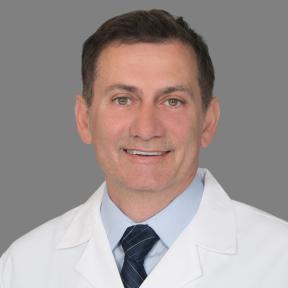
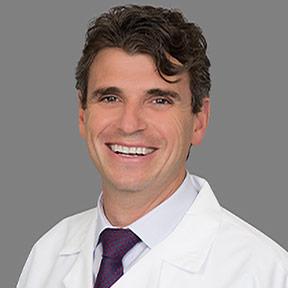



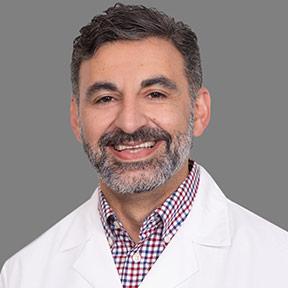

Other Team Members
- Nurse Practitioner, Pediatric & Adult Congenital Cardiac Surgery
- Client Services Coordinator for Pediatric Cardiac Surgery Clinic
- Nurses and Radiological Technologists
- Child Life Specialists

